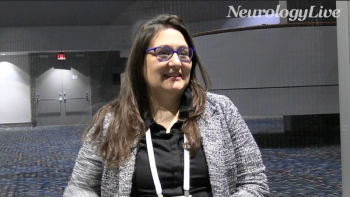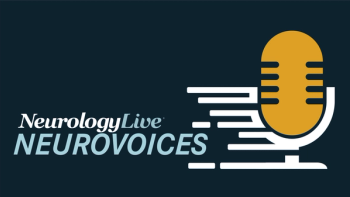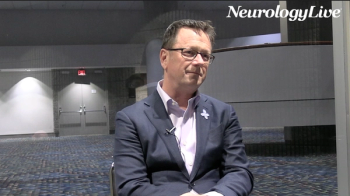
Christopher Kenney, MD, FAAN, chief medical officer at Xenon Pharmaceuticals, reviews encouraging long-term data behind azetukalner, a first-in-class Kv7 channel opener, as a potential treatment for focal onset seizures.

Marco Meglio, Assistant Managing Editor for NeurologyLive, has been with the team since October 2019. Follow him on Twitter @marcomeglio1 or email him at [email protected]

Christopher Kenney, MD, FAAN, chief medical officer at Xenon Pharmaceuticals, reviews encouraging long-term data behind azetukalner, a first-in-class Kv7 channel opener, as a potential treatment for focal onset seizures.

Sanofi's tolebrutinib fails to meet key trial endpoints for multiple sclerosis, delaying FDA review and raising questions about its future in treatment.

Test your neurology knowledge with NeurologyLive®'s weekly quiz series, featuring questions on a variety of clinical and historical neurology topics. This week's topic is on FcRn-blocking therapies in neurology!

Elizabeth Thiele, MD, PhD, director of the Pediatric Epilepsy Program at Massachusetts General Hospital, discusses new data on Epidiolex use in DEEs beyond Dravet, LGS, and TSC.

The director of the Adult Epilepsy Genetics Clinic at Northwestern University discussed short- and long-term goals for research, natural history development, and community engagement of the AES-sponsored GEAN Consortium. [WATCH TIME: 3 minutes]

Mind Moments®, a podcast from NeurologyLive®, brings you an exclusive interview with Sneha Mantri, MD, MS. [LISTEN TIME: 24 minutes]

New findings reveal bexicaserin significantly reduces seizure frequency in patients with developmental and epileptic encephalopathies, supporting its advancement to phase 3 trials.

The neurosurgeon at Cleveland Clinic discussed the goals of the AES thalamic neuromodulation special interest group and the major clinical and research priorities shaping the future of neuromodulation for drug resistant epilepsy.

The positive interim findings research represents the first clinical data for ETX101, an investigational cell-type-selective gene therapy, and the first potential one-time disease-modifying treatment for Dravet syndrome.

The director of the Pediatric Epilepsy Center of Excellence at the University of California San Francisco detailed early phase data of Encoded Therapeutics’ ETX101 gene replacement therapy in children with Dravet syndrome. [WATCH TIME: 3 minutes]

Sharon Hesterlee, PhD, president and CEO of the Muscular Dystrophy Association, discussed the 2026 MDA Conference, the significance of its keynote speaker, and the evolving therapeutic landscape in neuromuscular medicine.

Ovid Therapeutics' OV329 shows promise as a safe, effective GABA-AT inhibitor for treating drug-resistant seizures, with strong phase 1 trial results.

New AES 2025 data reinforce zorevunersen’s disease-modifying potential in Dravet syndrome, showing durable seizure reduction, functional improvements, and a consistent safety profile.

Test your neurology knowledge with NeurologyLive®'s weekly quiz series, featuring questions on a variety of clinical and historical neurology topics. This week's topic is on autonomic dysfunction in long COVID!

Recent analysis reveals Epidiolex significantly reduces seizures in patients with various developmental epileptic encephalopathies, showcasing its broad effectiveness.

A study reveals EEG and MRI biomarkers in MOGAD patients with epilepsy, highlighting potential early indicators for refractory epilepsy and improved treatment outcomes.

New findings reveal the challenges of treating pediatric epileptic encephalopathy with NBI-827104, highlighting the need for effective therapies.

New STIRUS data unveiled at AES 2025 demonstrate meaningful real-world reductions in seizures, status epilepticus, and healthcare needs with stiripentol in Dravet syndrome.

A groundbreaking phase 1 trial reveals promising results for a new stem cell therapy targeting Alzheimer disease, advancing to phase 2 studies.

Semaglutide shows no significant impact on Alzheimer disease progression in large trials, despite some biomarker improvements and consistent safety profiles.

New data highlights neflamapimod's potential in reducing biomarkers and improving clinical outcomes for dementia with Lewy bodies, paving the way for Phase 3 trials.

A recent study reveals that Araclon's ABvac40 vaccine may slow cortical perfusion decline in patients with Alzheimer disease, suggesting potential cognitive benefits.

A phase 2 study at CTAD 2025 explores VHB937's potential in treating early Alzheimer disease, focusing on safety and efficacy in patients.

New findings reveal the feasibility of self-administering remternetug, a monoclonal antibody for Alzheimer, enhancing treatment options for early-stage patients.

A Korean study reveals that adjusted MMSE thresholds significantly increase eligibility for anti-amyloid treatments, highlighting demographic disparities and safety concerns.

Baptist Health Brain & Spine enhances its neurology leadership with Peter Abdelmalik, MD, focusing on patient care, education, and operational efficiency.

Test your neurology knowledge with NeurologyLive®'s weekly quiz series, featuring questions on a variety of clinical and historical neurology topics. This week's topic is on Phosphorylated tau 181!

Mind Moments®, a podcast from NeurologyLive®, brings you an exclusive interview with Christina Briscoe, MD. [LISTEN TIME: 24 minutes]

uniQure navigates FDA's unexpected shift on AMT-130, aiming for accelerated approval for Huntington's disease despite recent regulatory challenges.

Charles Bernick, MD, a staff neurologist at the Cleveland Clinic Lou Ruvo Center for Brain Health, commented on the scientific rationale, therapeutic strategies, and biomarker advances driving the next wave of anti-tau drug development in Alzheimer disease.